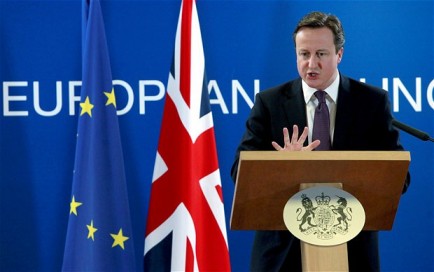
British Prime Minister David Cameron is a believer that the EU, and the UK, are stronger together, but will let the people decide on June 23.
Put the date in your diaries – June 23rd, a Thursday at the height of summer; a date that could shape the destiny of not just the UK, but the whole of Europe.
British Prime Minister David Cameron has set that date for the UK’s In/Out referendum on Europe, catching many in the media who thought the date would be much later in the year (possibly even 2017) off guard…
Cameron wants the UK to remain in the EU, but has spent the past few days in Brussels negotiating a tough new package that would serve to give Britain almost ‘special’ status within the EU.
Some of the PM’s key successes over these past few days have been a guarantee that the UK will never join the single currency, will never join Schengen, and can impose tougher benefit sanctions on non-British EU citizens, at least for the first four years of their time in the country.
The real hard work begins now, however, as Cameron has to convince large swathes of a sceptical electorate to vote to remain in the EU. Opinion polls put the “In” camp slightly ahead on 55%, but if spring and summer once again brings hundreds of thousands of refugees and migrants to the EU’s door this year, then the mood could certainly swing.
However, Cameron has warned that a Brexit is a risky step into the unknown, and will champion the reform package he secured as proof that Britain can enjoy a ‘best of both worlds’ relationship with the EU.
“We should be suspicious of those who claim that leaving Europe is some automatic fast-track to some land of milk and honey,” Cameron said.
If the UK were to vote to leave, change would not be immediate, and the exact implications for the two million or so Brits living and working elsewhere in the EU – as well as the two million EU nationals in the UK – are unknown.
London conducted a trial ‘War Game’ last month that set out what might happen if the UK voted itself out. The simulation found that the mood on both sides of the channel turned toxic quite quickly, with negotiations on how the country would step away from the various treaties culminating in fractious discussions and tumbling values of both the pound and the euro.
In short, a Brexit would be painful for all, at least in the short term. Any mid-term bounce would be dependent on the UK securing trade deals with the EU and the US, while the very fabric of the EU would have to be even more tightly woven by Brussels to ensure no further unravelling. That, in itself, could prove dangerous and prompt other countries to seek to leave.
In short, the dangers of this unknown territory are too great for most to ponder, and any benefit of leaving the EU – largely centred on being able to control the UK’s borders more tightly – would be seriously outweighed by the negatives.
But, despite what many might argue, this is a democracy, so if the people decide on June 23 that the UK is better off outside looking in than a newly emboldened and key member of the EU, then so be it. We don’t know what will happen if that scenario comes to pass, but one thing is certain – Brits in Spain are going to have things that little bit tougher if the “Out” votes win.
 en
en



 Vlaams-Nederlands
Vlaams-Nederlands
0 Comments
Leave a Comment
DISCLAIMER
The opinions and comments expressed by contributors to this Blog are theirs alone and do not necessarily reflect the views of VIVA Homes Under the Sun Ltd, any of its associated companies, or employees; nor is VIVA to be held responsible or accountable for the accuracy of any of the information supplied.
Have you got something to say?